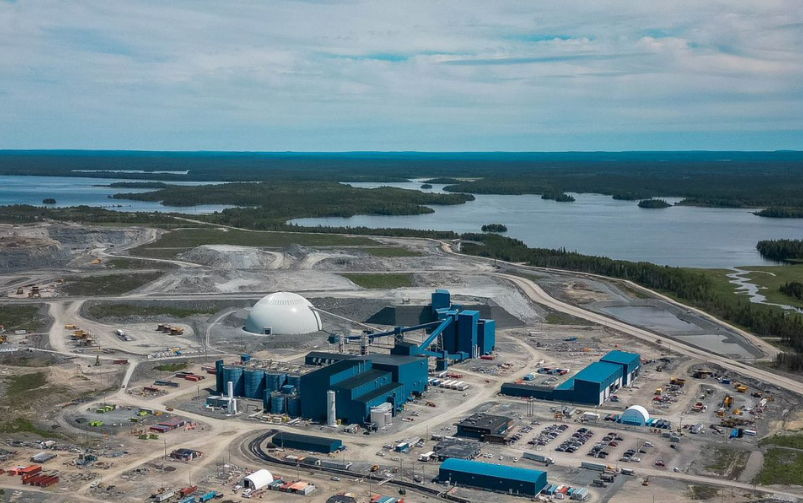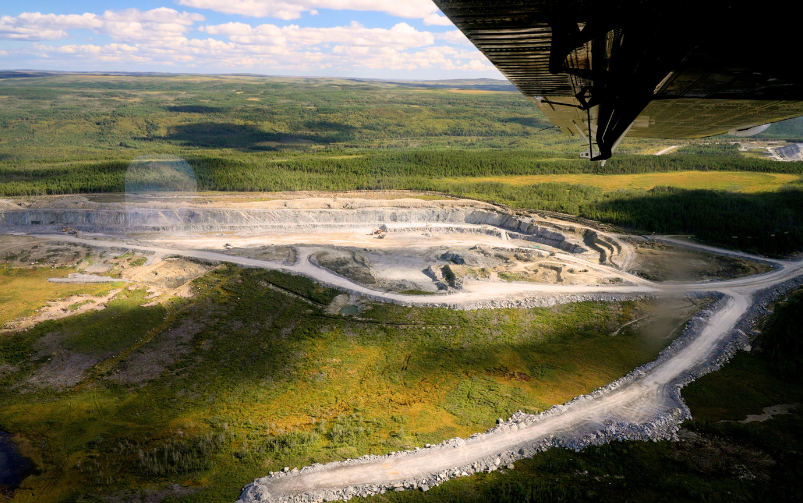Teck’s Highland Valley Copper operations in B.C. The Canadian government secured a commitment from Teck Resources to reinvest a significant amount of the proceeds from the sale of its steelmaking coal business to Glencore into its copper growth portfolio. Courtesy of Teck Resources
The federal government’s move to limit foreign takeovers of Canadian critical minerals miners is not likely to have a significant impact on the sector and should only affect the country’s largest companies, lawyers and analysts say.
In a July 4 statement that accompanied the approval of Glencore’s US$6.9 billion acquisition of Elk Valley Resources (EVR), Teck Resources’ metallurgical coal business, Minister Francois-Philippe Champagne said that moving forward, he would only give the go-ahead to foreign acquisitions of “important Canadian mining companies engaged in significant critical minerals operations…in the most exceptional of circumstances.”
The majority of such transactions would no longer meet the net benefit test under the Investment Canada Act, Champagne said, adding that the new higher bar was reflective of the “strategic importance” of Canada’s critical minerals sector and the need to take “decisive action” to protect it.
Michael Pickersgill, partner at Torys LLP and head of the firm’s mining and metals practice, said in an interview with CIM Magazine that the policy is intended to nurture the energy transition industry.
“Critical minerals are one thing we have—we actually aren’t as big as some people think we are in pure critical minerals themselves—but [we have] leading companies in ownership of those assets and new potential assets,” he said. “The government wants to maintain that infrastructure and includes having Canadian-headquartered companies—with industry leadership in Canada—because it helps develop and maintain a leading global role.”
Increased scrutiny
Canada has significantly stepped up its scrutiny of foreign investments and takeovers of Canadian miners in recent years. In 2022, the government began requiring any attempted investment or acquisition of a domestic miner by a state-owned enterprise to go through a national security review (NSR), leading to a record year for NSRs in 2022-23, which saw 32 investments, a jump from 24 investments in the previous year, according to the Investment Canada Act annual report.
Solaris Resources, a Canadian junior with an exploration-stage copper-gold project in Ecuador, cancelled a $130 million investment from China’s Zijin Mining in May, stating that the deal would take too long to get through its NSR.
In July, Falcon Energy Materials—formerly SRG Mining—re-domiciled its headquarters from Montreal to the United Arab Emirates (UAE). Back in March, the company had called off a $16.9 million investment deal with a Chinese firm due to a lengthy approval process.
In a July 2 press release, Falcon stated that the move to the UAE will provide it “with expanded strategic options as it advances its partnership discussions.”
Mike Kilby, a partner at Stikeman Elliott and head of the firm’s competition and foreign investment group, said the policy has echoes of the debate in the early 2000s about the impact of seeing three domestic mining giants, Inco Ltd, Falconbridge Ltd. and Alcan, subsumed by Vale, Xstrata and Rio Tinto respectively. (Stikeman represented Teck Resources in the sale of EVR.)
“The narrative there was, ‘is this good policy?’ Not that it threatens national security but that…there are benefits to the Canadian mining ecosystem associated with having very large-cap mining companies headquartered in Canada, incorporated in Canada and listed on the Toronto Stock Exchange,” he said.
The policy has raised concerns in the sector that foreign investors will become skittish of investing in Canadian companies, even those that are small or medium tier.
“If you create constraints in a capital market, that can’t be positive,” said Dean McPherson, head of global mining for TMX Group Ltd., which operates the Toronto Stock Exchange and TSX Venture Exchange, in an interview with CIM Magazine. “Companies will have to start looking at ways to protect themselves.”
Jeff Killeen, director of policy and programs at the Prospectors and Developers Association of Canada, said in an email to CIM Magazine that the lack of clarity around the phrase “in the most exceptional of circumstances” creates uncertainty that could negatively impact domestic miners’ valuations relative to global peers.
Kilby, however, downplayed the impact of the new guidance. Unlike an NSR, which can apply to transactions of any size and nature, the ICA’s net-benefit test only comes into play during foreign buyers’ wholesale takeovers of Canadian companies of significant size, usually those worth $2 billion or more.
He said that the government has blocked transactions on net-benefit grounds only twice, which includes BHP’s 2010 attempted hostile takeover of Potash Corp, which was based in Saskatoon, and later merged with Agrium to form Nutrien.
Scotiabank analysts Orest Wowkodaw and Eric Winmill wrote in a July 16 note that they expected “only the largest Canadian-headquartered critical mineral miners are likely to be fully ring-fenced from foreign buyers” and that the government was unlikely to stand in the way of M&A transactions involving small and mid-tier companies unless there are national security concerns.
“The status of near-term or in-construction development projects could be open for interpretation if they involve large assets that have material impacts to their respective commodity markets; these are likely to be treated on a case-by-case basis,” they wrote.
Wowkodaw and Winmill stated that they believe Teck and Cameco to be off-limits to foreign buyers, and possibly Nutrien. Large miners with no assets in Canada and relatively small corporate offices, such as First Quantum Minerals and Ivanhoe Mines Ltd., “are likely exempt from the policy,” they wrote.
Buyer commitments
Kilby said he does not see the policy as closing the door on all attempted takeovers of large-cap domestic miners. The pathway to getting a deal approved has historically been about the commitments the buyer makes, which can include committing research and development dollars to Canada, and, in the mining sector, advancing Canadian projects.
The government would also likely be open to acquisition attempts by companies with headquarters in Five Eyes (an intelligence alliance compromising Australia, Canada, New Zealand, the United Kingdom and the United States) or other friendly jurisdictions, Pickersgill said.
He said that the policy statement should be read in conjunction with the government’s approval of the Glencore-Teck deal. While metallurgical coal is not listed among Canada’s critical minerals, the government did include conditions to the sale.
The multinational was required to commit to establishing and maintaining a Canadian head office for EVR in Vancouver, and regional offices in Calgary and Sparwood, B.C., and ensuring the majority of EVR’s directors are Canadians and at least two-thirds of executives and senior management roles are Canadians, all for at least 10 years. In addition, for at least five years, the company must maintain “significant employment levels” at EVR.
Glencore inherited Teck’s obligations under the reclamation bond required by the B.C. government. It also assumed responsibility for paying any environmental obligations under Canadian law that are not covered by the bond, through to 2050. The company would remain responsible for those obligations even if it decides to sell or de-merge EVR in the future, unless the industry minister is satisfied that EVR’s new owner could take over its environmental liabilities.
The company also agreed to spend an extra $350 million on rehabilitation and closure activities over a five-year period, to maintain EVR’s commitments to First Nations and to work “in good faith” with First Nations to find any opportunities to increase their benefits from the met coal operations.
“The intention here is they want to support the development of Canadian industry,” Pickersgill said. “The focus [in the conditions] was around protecting a Canadian company itself, as would be expected in the net-benefit context. But what’s interesting is they also layered in elements around environmental, social and governance (ESG) commitments, around maintaining remediation obligation commitments. They did look at this a bit more holistically in thinking about maintaining a Canadian business and Canadian operating standards.”
Longer approval timelines will likely be a feature of any major transactions going forward, Pickersgill said.
“The [Glencore-Teck] deal took eight months to work through,” he said. “One can expect just given the political nature of this, even if people want to try to construct exceptional circumstances for transactions, we’re talking about [longer time-frames].”




